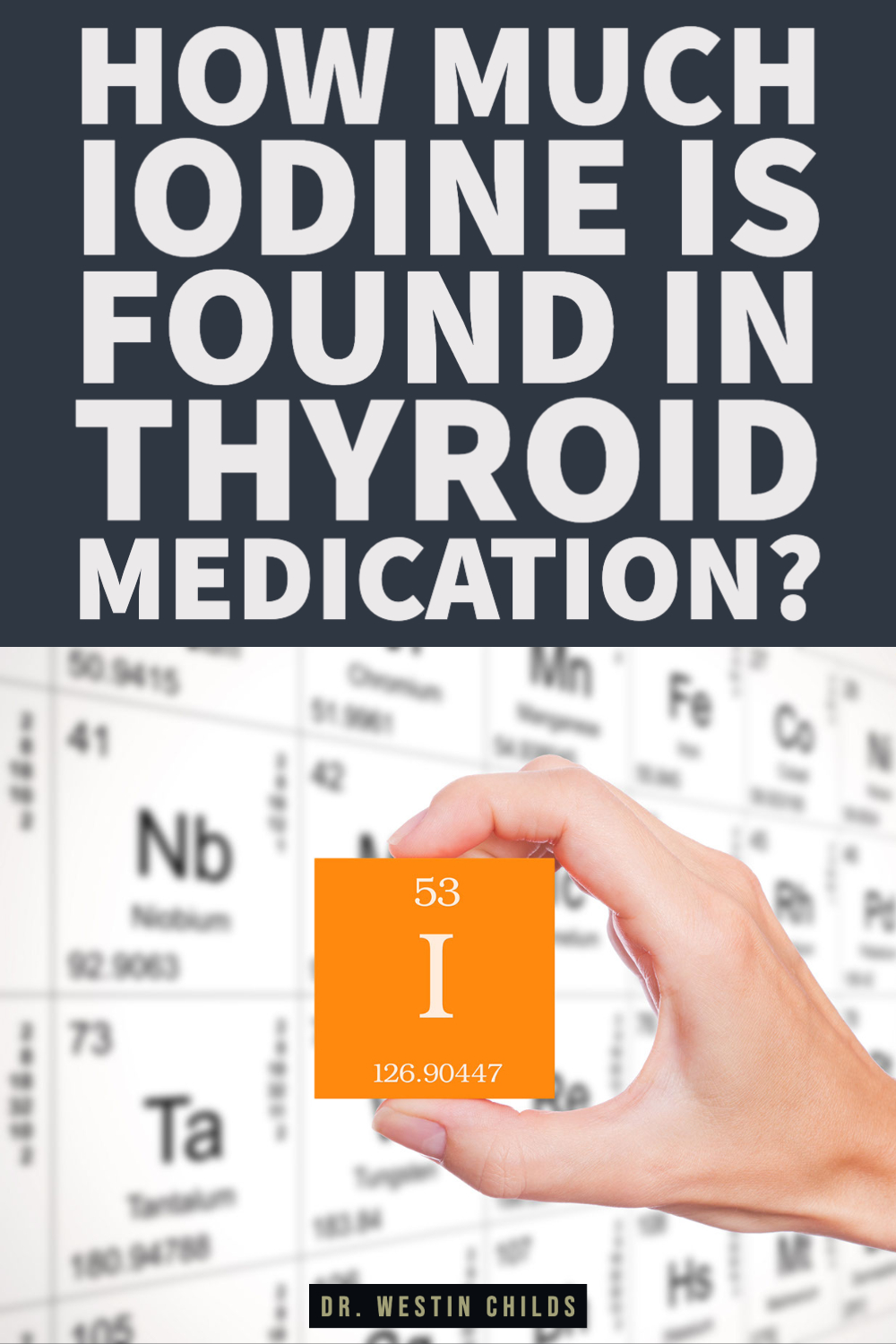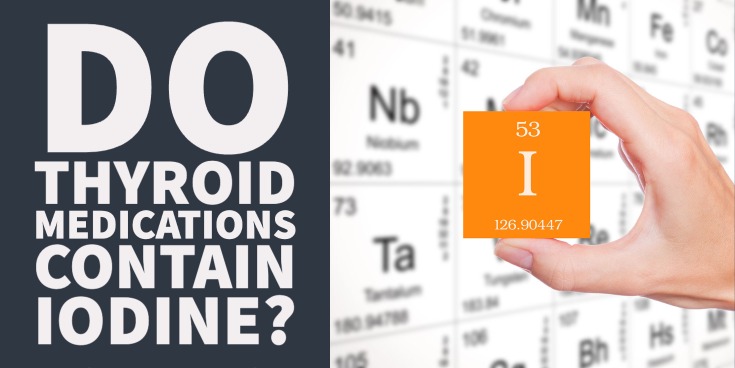I’ve spent a lot of time debunking the idea that iodine is somehow harmful to thyroid patients.
One of the ways that I do this is by explaining how important iodine is for the body, how it’s required for thyroid hormone production, why your body can’t live without thyroid hormone, and so on.
This argument is compelling because if you become iodine deficient, you may eventually die from a lack of thyroid hormone.
I’ve also explained why most thyroid patients who think they are avoiding iodine, are actually coming into contact with it all of the time in their diet.
This is because iodine is found in foods like dairy, eggs, cheese, and even some fruits like bananas and strawberries.
Well, it turns out there’s another source of iodine that you probably aren’t aware of and that’s your thyroid medication.
Contrary to what you might think, all thyroid medications contain iodine that, when taken, can be broken down and used by the body.
And that’s exactly what I want to talk about today.
DOWNLOAD FREE RESOURCES
Foods to Avoid if you Have Thyroid Problems:
I’ve found that these 10 foods cause the most problems for thyroid patients. Learn which foods you should avoid if you have thyroid disease of any type.
The Complete List of Thyroid Lab tests:
The list includes optimal ranges, normal ranges, and the complete list of tests you need to diagnose and manage thyroid disease correctly!
Thyroid Medication & Iodine Content
Thyroid medications can contain iodine in two different ways:
The first, which all forms of thyroid medication have in common, is a bound form of iodine which is a natural part of the thyroid hormone molecule.
The second, found in only some forms of thyroid medication, is the addition of free iodine on top of the iodine found in the thyroid hormone.
Let me explain a little bit more about the first source because that one is slightly more confusing.
Bound Iodine Found in Thyroid Medication
In order to understand how thyroid hormones contribute to your iodine status, you have to understand what makes up a thyroid hormone molecule.
At its most basic level, it’s really just a combination of tyrosine (an amino acid) and iodine.
Your thyroid gland creates the various types of thyroid hormones floating around in your body by combining tyrosine and iodine together using a protein called thyroid peroxidase.
You don’t really need to understand how your body creates thyroid hormone but you should know that each thyroid hormone contains iodine.
And the amount of iodine that it contains is what determines what your body does with it and what we call it.
For instance, if your body attaches 4 iodines to a tyrosine, it just created T4 thyroid hormone.
You can see these iodines when you look at the structure of different types of thyroid hormones (1).
This is important because it means that if you are taking thyroid medication by mouth, you are getting iodine. Period. End of story!
The iodine that you are getting is not in the same form as it would be if you were to eat iodine-rich foods or get iodine from supplements.
But you better believe that your body is capable of breaking down the thyroid hormones in your thyroid medication and recycling the iodine found within (2).
In other words, T4-only thyroid medications like levothyroxine and Synthroid contain 4 iodine molecules that your body can ultimately break down and recycle.
This same concept applies to all thyroid medications.
If you are taking T3-only thyroid medication (like Cytomel or liothyronine), there are 3 iodine molecules that can be broken down and recycled into the body.
The iodine that your body recycles from your thyroid medication can then be used to create more thyroid hormones or support other cellular functions.
So even though it’s not a free source of iodine, your body will make use of it nonetheless.
Some Thyroid Medications Contain Even More Iodine
No matter what type of thyroid medication you are taking, you are getting some amount of iodine from this recycling.
But other thyroid medications have additional free iodine included on top of this (for better or worse).
What medications am I talking about?
Because these medications come from the thyroid glands of animals (usually pigs), they contain additional iodine.
Here’s why:
The thyroid gland in both humans and animals concentrates and stores iodine in the thyroid gland (3).
When you create a thyroid medication out of the contents of the thyroid gland (exactly what is done for NDT), you will not only be getting thyroid hormones, but you will also get whatever else is found inside of it.
This isn’t a bad thing, it just is what it is, and something you have to accept if you take Natural Desiccated Thyroid like Armour thyroid or NP Thyroid.

A big part of the reason these thyroid medications are so effective (and loved by thyroid patients (4)) is that they contain these additional ingredients.
NDT formulations contain many more hormones and active ingredients compared to synthetic medications like levothyroxine including T4, T3, T2, calcitonin, T1 (likely), iodine, tyrosine, proteins, enzymes, and more.
It’s hard to know exactly how much iodine is found in NDT formulations but some people estimate 1 grain to have around 130 mcg of total iodine.
If that is correct, NDT formulations provide the body with a fairly significant source of iodine when accounting for free iodine and iodine found in other forms such as the thyroid hormones themselves.
How Much Iodine Does Thyroid Medication Contain?
Believe it or not, it’s hard to know exactly how much iodine is contained in thyroid hormone.
We can calculate, by atomic weight (5), the amount of iodine that would be found in a set amount of thyroid hormone, but you still have to take into account various other factors in the body that can alter the number.
For example:
- How much of that thyroid hormone is actually absorbed into your system? Just because you are taking 100 mcg of levothyroxine doesn’t mean you are absorbing 100 mcg!
- How much of the iodine that is absorbed is recycled by the body and used to create thyroid hormone versus used for other purposes? If your body is using that iodine for breast health (6) or salivary gland health (7), it’s not as relevant to this discussion.
- How much of the iodine that is recycled is being excreted by the body?
- How well is your body metabolizing and converting thyroid hormones? Is iodine getting stuck in a compound such as reverse T3 instead of being converted down to T1?
The answers to these questions will obviously vary from person to person based on their genetics, their overall health, and the type and form of thyroid medication that they are taking.
While I can’t give you an exact amount, what I can say is that it’s definitely the case that some iodine is absorbed and utilized by the body whenever you take thyroid medication.
Based on my research, I would estimate that every 100 mcg of levothyroxine provides roughly 40 to 50 mcg of iodine.
This takes into account the atomic weight of iodine in T4 thyroid hormone, the absorption of thyroid medication, the recycling of iodine, and the excretion of iodine from the bile.
If you want to estimate how much iodine you are getting from your T4-only thyroid medication then you can multiply your dose by around 40 to 50% to get an idea of how much iodine it is providing.
For example, if you were taking 75 mcg of levothyroxine you would likely be getting around 30 mcg to 37.5 mcg of iodine with each dose.
The amount of iodine found in T3-only thyroid medications would be slightly less than this figure because T3 contains 25% fewer iodines than T4.
It’s more difficult to figure out how much iodine would be found in Natural Desiccated Thyroid medications but you can assume that the dose would definitely be higher than that of T4.
How Much Iodine Should You Get?
The real question is:
What should you do with this information?
And my response is pretty simple…
Not much.
My general recommendation when it comes to iodine intake for thyroid patients is to match the recommended daily allowance which is set at around 150 to 270 mcg of iodine each day (8).
This range of iodine intake has been shown to be safe for thyroid patients which means that getting this much iodine each day will not increase your risk of autoimmune thyroid disease or thyroid-gland issues like goiter.
Even though thyroid medications do contain some iodine, based on the average dose that most people take, they don’t contain enough to cause issues for the majority of thyroid patients.
And, even if they did, the benefits of taking thyroid medication and getting some iodine would outweigh the negative consequences of not taking it at all.
My main intent for sharing this information is just to highlight that even though you think you may be avoiding iodine, you aren’t and you can’t.
At least not forever.
The next time your doctor tells you to avoid iodine you should ask them what they think about the iodine content found in thyroid medication.
And if they don’t have an answer to that question, then perhaps they aren’t as knowledgeable about the thyroid as they led you to believe!
Recap
- Iodine is required for human beings because it’s necessary to produce thyroid hormones.
- Regardless of thyroid status, some iodine intake is necessary.
- All thyroid medications contain iodine because they contain thyroid hormones.
- Thyroid hormones are made by combining tyrosine and iodine together.
- When taken, the body will metabolize thyroid hormone and recycle the iodine molecules found inside of the thyroid medication.
- Assessing the amount of iodine found in each dose of thyroid medication is very difficult.
- The safe range of iodine intake for thyroid patients is 150 to 270 mcg of iodine taken daily from all sources.
Now I want to hear from you:
Were you aware that all thyroid medications contain iodine?
Were you aware that iodine is found in all sorts of places like food, cosmetics, and medications?
Are you planning on adjusting how much iodine you are getting each day?
Are you planning on switching to a different thyroid medication?
Leave your questions or comments below!
Scientific References
#1. pubchem.ncbi.nlm.nih.gov/compound/Levothyroxine#section=2D-Structure
#2. https://erc.bioscientifica.com/view/journals/erc/25/4/ERC-17-0515.xml#
#3. ncbi.nlm.nih.gov/pmc/articles/PMC8709459/
#4. pubmed.ncbi.nlm.nih.gov/23539727/
#5. pubchem.ncbi.nlm.nih.gov/element/Iodine
#6. breast-cancer-research.biomedcentral.com/articles/10.1186/bcr638
#7. ncbi.nlm.nih.gov/pmc/articles/PMC3063534/
#8. ncbi.nlm.nih.gov/books/NBK222323/


Leave a Reply to Gina Ladick Cancel reply